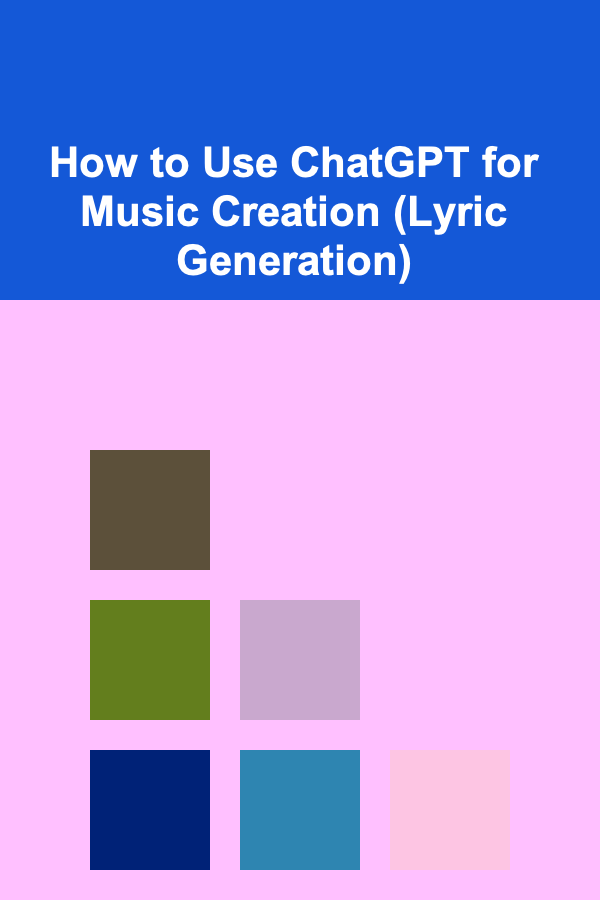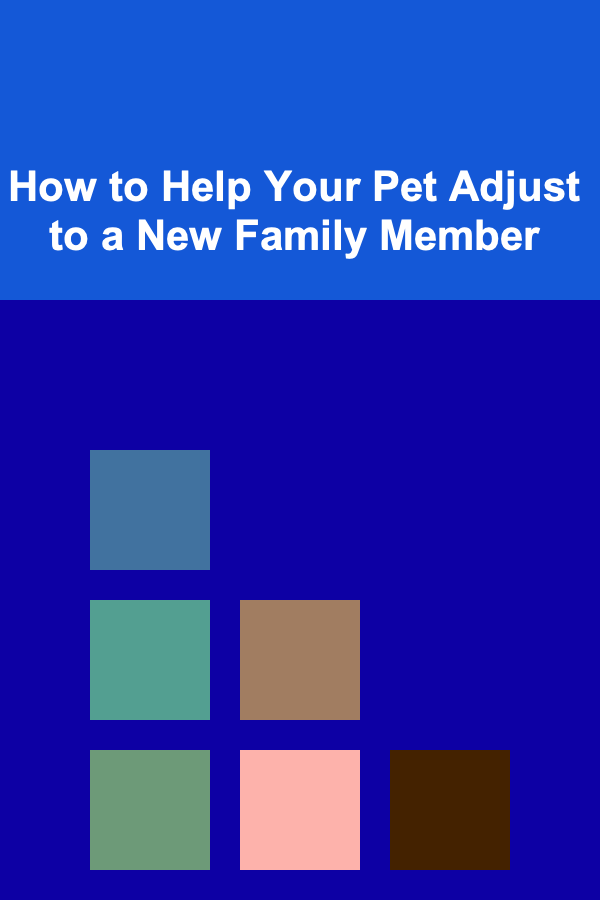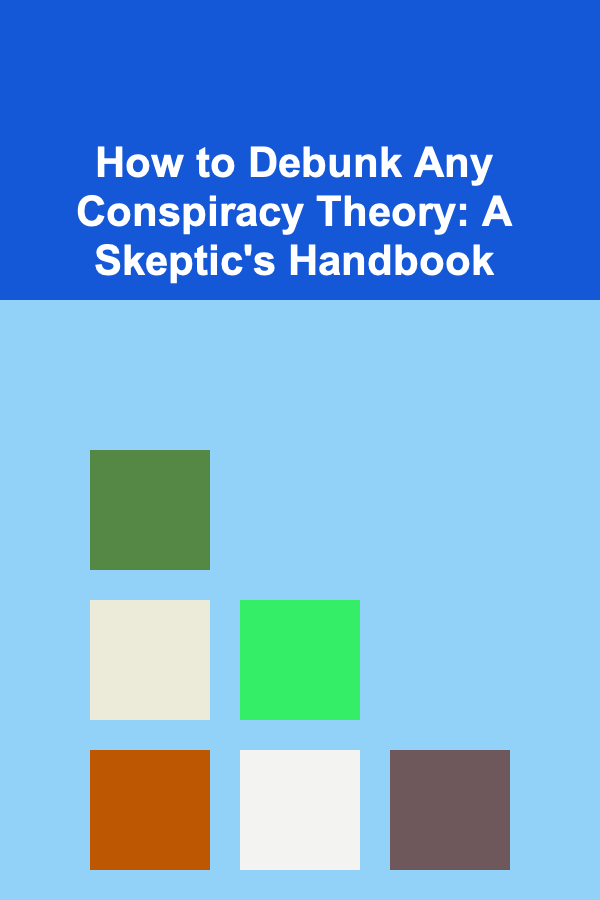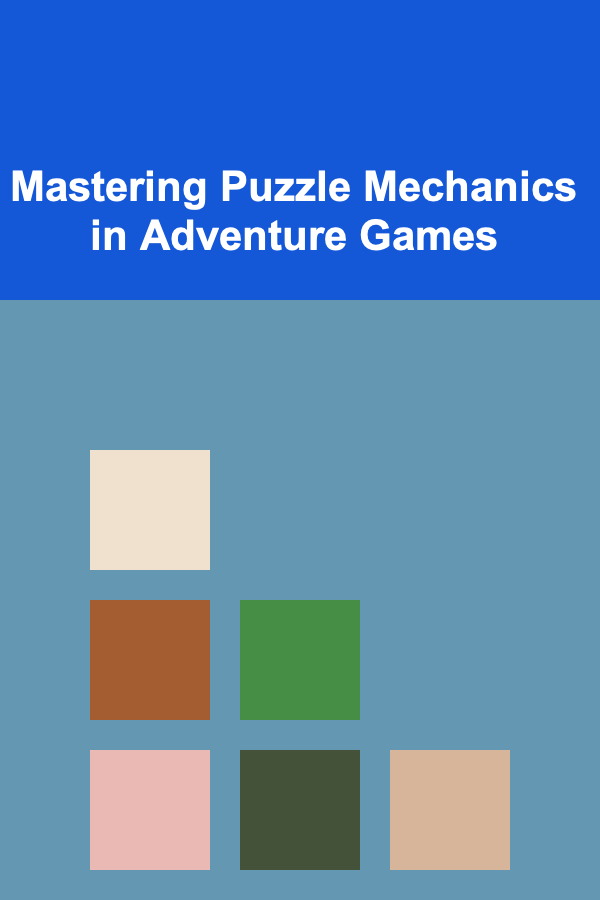
How to Use ChatGPT for Music Creation (Lyric Generation)
ebook include PDF & Audio bundle (Micro Guide)
$12.99$6.99
Limited Time Offer! Order within the next:

The advent of AI technologies has revolutionized many aspects of creative work, and music is no exception. Among the most exciting innovations in the field of music creation is the use of large language models like ChatGPT. These AI-driven tools can be powerful allies in the songwriting process, capable of generating lyrics, assisting with themes, and even suggesting melodies or chord progressions. This article explores how ChatGPT can be effectively used for music creation, particularly for generating lyrics, and dives deep into practical approaches, tips, and creative workflows.
Understanding ChatGPT's Role in Music Creation
ChatGPT, developed by OpenAI, is a language model trained on vast amounts of text data. This includes books, websites, and other sources of written content. As a result, it has an impressive understanding of language, tone, and even emotional expression. For musicians, especially those involved in songwriting, ChatGPT provides an invaluable tool to help spark creativity, overcome writer's block, or even generate complete lyrics for new songs.
The Power of AI in Lyric Generation
Music lyrics are deeply emotional, and they often come from the soul of the writer, reflecting experiences, feelings, and perspectives. However, songwriting is also a craft, one that can sometimes benefit from external input. ChatGPT's ability to generate lyrics can serve as a creative partner, offering new ideas, themes, or simply fresh ways to express a concept or story.
But how exactly can ChatGPT be used for this purpose? In the following sections, we will dive into various strategies for leveraging ChatGPT in music creation.
Setting the Foundation: Getting Started with ChatGPT for Lyric Creation
Before diving into lyric generation, it's important to understand how to engage with ChatGPT effectively. Here are the essential steps to getting started:
1. Understanding the Inputs
When working with ChatGPT for lyric generation, the quality of the output largely depends on the input. Being clear and specific about what you want from the AI can lead to more focused and relevant results. For instance, you can provide the AI with:
- Song Themes: Are you writing a love song, a song about overcoming hardship, or something abstract? Clearly define the theme.
- Tone and Emotion: Is the song intended to be upbeat, melancholic, hopeful, or rebellious? Let ChatGPT know the emotional tone.
- Genre: The genre (rock, pop, rap, country, etc.) will guide the language, phrasing, and rhythm of the lyrics.
- Specific Phrases: You can provide certain lines or phrases you want included, or ask the AI to create lyrics around specific words or imagery.
By defining these elements, you help ChatGPT understand your creative direction and produce lyrics that align with your vision.
2. Generating Lyric Prompts
Start by providing a basic prompt. For example:
- "Write a love song chorus about the bittersweet feeling of being apart from someone."
- "Generate a rap verse that talks about overcoming adversity and finding strength in difficult times."
The more descriptive and specific your prompt, the better ChatGPT can tailor the output to meet your needs. You can even specify the structure of the song, such as asking for a verse-chorus-verse format or a bridge in between.
How ChatGPT Enhances Creativity in Lyric Writing
AI's role in the creative process isn't to replace the artist but to enhance the creative journey. ChatGPT offers various tools to explore new ideas and experiment with different lyrical styles, providing fresh inspiration.
1. Overcoming Writer's Block
One of the most frustrating aspects of songwriting is experiencing writer's block---when the creative flow simply isn't there. ChatGPT can help by suggesting lyrical lines or generating entire sections of a song. This can get the ball rolling and break the mental block, giving you a foundation to build upon. Even if the AI's suggestions aren't perfect, they can serve as starting points for further refinement.
2. Expanding Vocabulary and Synonyms
Writers often struggle to find the right words to convey their emotions or ideas. ChatGPT can expand your vocabulary by offering synonyms or more expressive phrases, helping you articulate your message more clearly. You can ask the AI for suggestions like, "Can you provide a more poetic way of saying 'I miss you'?" or "What's another way of saying 'I'm lost in thought'?"
3. Experimenting with Different Perspectives
Sometimes, a song can benefit from being written from a different perspective. ChatGPT can help you explore alternate points of view, such as writing a song from the perspective of a character, an object, or even an abstract idea. For example, you could request, "Write a song from the perspective of a flower in a field," or "Write lyrics from the viewpoint of a person watching their former self."
4. Adapting to Various Genres and Styles
Music spans a wide range of genres, and each has its own conventions for lyrics and themes. ChatGPT can adapt to various musical styles and help you experiment with genres you may not have written in before. For example:
- Pop: Catchy, straightforward, and often about love or relationships.
- Rap: Rhyming, rhythmic, and often addressing social issues, personal struggles, or triumphs.
- Country: Story-driven, emotional, and often includes themes of life in rural settings or personal experiences.
- Rock: Raw emotion, freedom, rebellion, or introspection.
You can give ChatGPT genre-specific prompts to ensure the generated lyrics reflect the appropriate style and tone for the music.
Techniques for Structuring Your Lyrics with ChatGPT
Once you start working with ChatGPT, the next challenge is structuring the lyrics into a cohesive song. Here are some common approaches that can help guide you:
1. Use ChatGPT to Draft Verses and Choruses
Start by asking the AI to write a verse or chorus, and then build on it. A typical approach could be:
- Verse 1: Establish the setting or the problem.
- Chorus: The emotional core of the song, repeated for impact.
- Verse 2: Develop the story or emotion further.
- Bridge: A contrast or new perspective.
- Final Chorus: A powerful conclusion.
ChatGPT can generate lyrics for each of these sections, helping you stay consistent with the theme while experimenting with different structures.
2. Working on Rhyming and Flow
Rhythm and rhyme are essential in music lyrics, especially in genres like rap, pop, and rock. You can instruct ChatGPT to focus on creating rhymes or flowing verses. For example, you can input: "Write a four-line stanza with an ABAB rhyme scheme about missing someone."
3. Refining and Editing the Output
While ChatGPT's outputs are a great starting point, they often need refinement. You can take the lyrics and adjust them to better fit your melody, voice, or style. ChatGPT can also help you revise lines by suggesting alternate phrasing or adjusting tone to suit the music better.
Collaborative Music Creation: ChatGPT and Human Creativity
One of the most exciting aspects of using ChatGPT in music creation is the potential for collaboration. AI can work alongside human creativity, offering a symbiotic relationship where the artist directs the flow of creativity while the AI offers valuable assistance.
1. Brainstorming Sessions
You can use ChatGPT as a brainstorming partner. Present an idea or theme, and let the AI provide a range of possibilities, helping you explore angles you might not have thought of. For example, you could ask, "What are some interesting ways to write about the passage of time?" or "Can you suggest different metaphors for love?"
2. Co-Writing Lyrics
ChatGPT can act as a co-writer, suggesting lines or sections of a song while you refine or build upon them. This collaborative process can lead to surprising and unique lyrics. You can adjust the tone or style based on the direction you want the song to go, and ChatGPT will adapt to your changes.
Ethical Considerations and Creative Ownership
When using AI in music creation, it's important to consider the ethical implications of AI-generated content. While ChatGPT can assist with lyric creation, the final creative direction, ownership, and originality still belong to the human artist. Here are a few key points to consider:
- Originality: AI-generated lyrics are based on patterns found in existing texts. While they may offer new perspectives, it's essential for musicians to ensure their work is original and not derivative.
- Creative Control: Musicians should maintain creative control over the lyrics and song. ChatGPT is a tool, not a creator. Its purpose is to assist, not replace, human creativity.
Conclusion
Using ChatGPT for music creation, particularly in lyric generation, offers a new way for musicians to express themselves and overcome creative challenges. Whether you're a seasoned songwriter or just starting, this AI tool can provide valuable assistance by offering fresh ideas, solving writer's block, expanding vocabulary, and helping you structure your songs effectively.
Ultimately, ChatGPT is not a substitute for the human touch but a creative partner in the songwriting process. By combining the AI's power with your personal creativity, you can unlock new possibilities for music creation that push the boundaries of what's possible.

How to Help Your Pet Adjust to a New Family Member
Read More
How to Make the Most of Under-Bed Storage in Small Bedrooms
Read More
How To Set Up Thematic Board Game Scenarios
Read More
How to Debunk Any Conspiracy Theory: A Skeptic's Handbook
Read More
Mastering Puzzle Mechanics in Adventure Games
Read More
10 Tips for Teaching Origami to Children
Read MoreOther Products

How to Help Your Pet Adjust to a New Family Member
Read More
How to Make the Most of Under-Bed Storage in Small Bedrooms
Read More
How To Set Up Thematic Board Game Scenarios
Read More
How to Debunk Any Conspiracy Theory: A Skeptic's Handbook
Read More
Mastering Puzzle Mechanics in Adventure Games
Read More